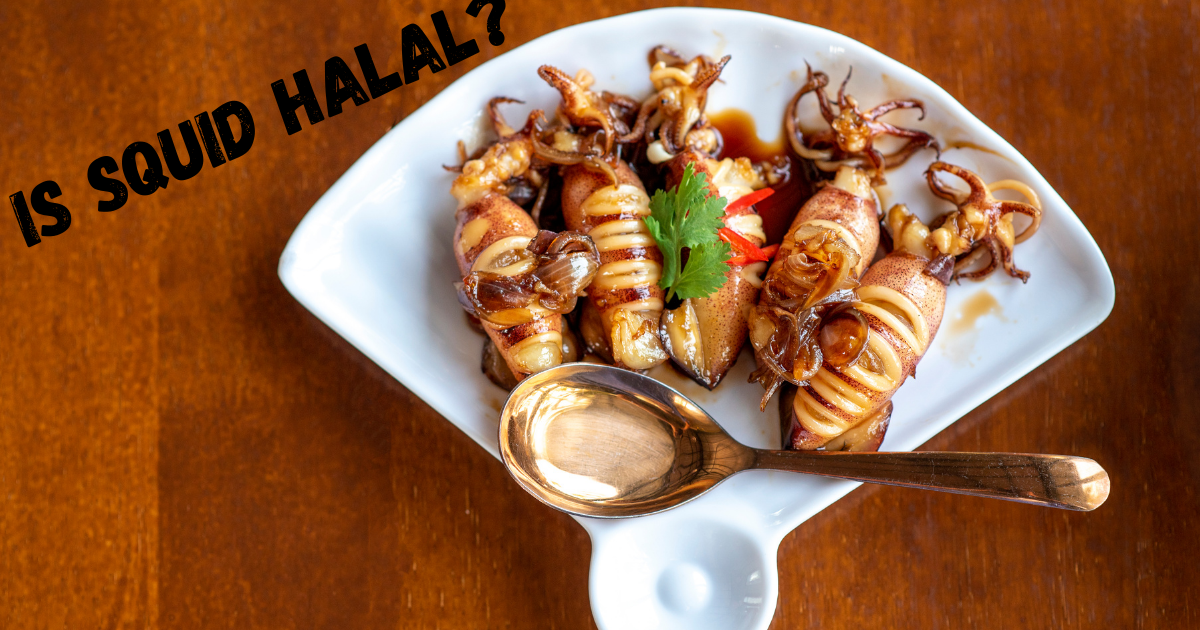“Is Squid Halal? Unravelling the Delicious Debate!”
Welcome to our blog post exploring the intriguing question: Is squid halal? As an important topic in Islamic dietary guidelines, we delve into the fascinating debate surrounding the permissibility of consuming squid.
Join us as we shed light on this culinary curiosity and provide you with the clarity you seek.
What is Halal Food?
Halal food refers to food that is permissible and lawful according to Islamic dietary laws. In Islam, certain guidelines and restrictions govern what Muslims can eat. The term “halal” is derived from Arabic and translates to “permissible” or “lawful.”
To be considered halal, the food must meet specific criteria, such as being prepared in accordance with Islamic principles, and it must not contain any forbidden substances or ingredients.
For instance, pork and its by-products, alcohol, and certain types of meat not slaughtered in the prescribed manner are all considered haram (forbidden) and are not permissible for Muslims to consume.
Halal food plays a significant role in the lives of practicing Muslims, ensuring they adhere to their religious beliefs while nourishing their bodies.
What is Squid?

Squid is a marine cephalopod mollusk, characterized by its torpedo-shaped body, ten tentacles, and intelligent eyes. With the ability to rapidly change color and texture, squid can camouflage and elude predators. These fascinating creatures play a vital role in marine ecosystems, serving as prey for various marine animals.
Human cuisine also features squid prominently, with dishes like calamari and soups showcasing its tender and flavorful meat. As versatile as they are intriguing, squids leave a mark both in nature and on our plates.
Is Squid Halal?
The halal status of squid is a topic of discussion among followers of Islamic dietary guidelines. According to Islamic teachings, seafood is generally considered halal, including fish, shrimp, and other permissible creatures.
However, opinions differ on whether squid meets the criteria for halal consumption. Some scholars argue that since squid resembles fish in appearance and lives in the water, it should be considered halal. Others point out that squid lacks scales, which are a specific requirement for fish to be considered halal.
As a result, the halal status of squid remains a matter of interpretation and individual beliefs within the Muslim community. It is essential for individuals seeking halal dietary practices to consult with their religious authorities for guidance.
Why Squid Is Halal?
In Islamic dietary guidelines, certain types of seafood are considered halal, which means they are permissible and lawful for Muslims to consume. Squid falls into the category of halal seafood for several reasons:
Marine Creatures
Islam permits the consumption of marine creatures, including fish and seafood. Squid, being a marine cephalopod, is considered part of this category.
Similar to Fish
Some Islamic scholars argue that squid shares similarities with fish in terms of its habitat and appearance. As fish are considered halal, this perspective extends to squid as well.
Absence of Forbidden Substances
Squid does not contain any forbidden substances, such as pork or alcohol, making it suitable for consumption under Islamic dietary laws.
It’s important to note that interpretations may vary among different scholars and Islamic traditions. While some consider squid to be halal, others may have differing opinions. For this reason, individuals seeking halal dietary practices are encouraged to consult with their religious authorities to ensure they adhere to the guidelines that align with their beliefs.
Is Squid Halal in Sunni Islam?
In Sunni Islam, the halal status of squid can be a subject of differing opinions among scholars and religious authorities.
While some scholars consider squid to be halal and permissible for consumption, others may have reservations due to certain factors, leading them to classify it as either questionable (mashbooh) or even haram (forbidden).
The primary point of contention revolves around the requirement for fish to have scales to be considered halal. Some scholars argue that since squid lacks scales, it should not be considered halal.
However, others may emphasize the general permissibility of seafood and draw comparisons to fish due to squid’s aquatic habitat and appearance, considering it as halal.
Given the diverse interpretations and varying scholarly opinions, it’s essential for individuals to seek guidance from their local religious authorities or scholars on matters of halal dietary practices, including the consumption of squid, to ensure they follow the rulings that align with their specific beliefs and religious traditions.
Is squid halal Shia?
In the Shia school of thought, the general consensus is that squid is considered halal and permissible for consumption. Shia scholars do not emphasize the requirement for fish to have scales to be considered halal, and they regard squid as part of the permissible seafood category.
Therefore, according to the Shia school of thought, squid is halal.
Can Muslims Eat Squid?

Whether Muslims can eat squid depends on their specific religious interpretation and adherence to Islamic dietary guidelines.
As mentioned earlier, there are differing opinions among scholars from both Sunni and Shia schools of thought regarding the halal status of squid.
Some Muslims, following certain interpretations, consider squid to be halal and permissible for consumption. They may view squid as similar to fish, which is generally considered halal.
On the other hand, some scholars raise concerns about the lack of scales on squid, as scales are traditionally seen as a requirement for fish to be considered halal.
Therefore, they may classify squid as either questionable (mashbooh) or even haram (forbidden).
Given these varying viewpoints, it is crucial for individuals to seek guidance from their local religious authorities or scholars to understand the rulings that align with their specific beliefs and religious traditions.
Muslims who wish to adhere to halal dietary practices should consult with their trusted religious sources to determine whether they can eat squid based on their particular interpretation of Islamic guidelines.
Is Octopus Halal Hanafi?
In the Hanafi school of thought, the majority view is that consuming octopus is not considered halal. This ruling is based on the absence of scales on octopus, which is traditionally seen as a requirement for fish to be considered halal in Islamic dietary guidelines.
Since octopus does not possess scales, it is generally regarded as haram (forbidden) for consumption by followers of the Hanafi school of thought. However, it’s essential to note that opinions may vary among individual scholars, and some may hold a more permissive view regarding the consumption of octopus.
As with any dietary matter, Muslims who follow the Hanafi school of thought should consult with their local religious authorities or scholars to seek specific guidance on matters of halal food consumption, including the permissibility of octopus.
Are there any Muslims that believe squid is haram?
Yes, there are Muslims who believe that squid is haram (forbidden) and, therefore, should not be consumed. As mentioned earlier, the permissibility of consuming squid in Islam is a subject of differing opinions among scholars from various Islamic schools of thought.
Some scholars, from both Sunni and Shia traditions, consider squid to be halal, while others have reservations about its halal status.
Those who believe squid is haram often cite the absence of scales on squid as a reason for its prohibition. According to certain interpretations of Islamic dietary guidelines, fish must have scales to be considered halal.
Since squid lacks scales, some Muslims, particularly from specific schools of thought, consider it to be haram for consumption.
As with many religious matters, interpretations can vary, and individuals may choose to follow the rulings of their particular religious authorities or scholars regarding the consumption of squid.
To ensure adherence to their beliefs and practices, Muslims seeking clarity on this matter are encouraged to consult with their local religious authorities for guidance.
Conclusion
In conclusion, the halal status of squid remains a subject of diverse opinions and interpretations among scholars from various Islamic schools of thought.
While some consider squid to be permissible and halal due to its aquatic habitat and resemblance to fish, others raise concerns about the absence of scales, traditionally seen as a requirement for halal fish.
As Muslims navigate the question of whether squid is halal, seeking guidance from their local religious authorities is essential to adhere to their specific beliefs and religious traditions.
Ultimately, understanding the principles behind halal dietary practices empowers individuals to make informed choices and align their consumption with their faith.
FAQs
FAQS About Is Squid Halal
Is squid ink halal?
The halal status of squid ink is a matter of differing opinions among Islamic scholars. Some may consider it halal, while others may have reservations. Muslims seeking to consume squid ink should consult with their local religious authorities for guidance on its permissibility in their specific beliefs and traditions.
Which seafood is haram in Islam?
In Islam, the following seafood is generally considered haram (forbidden) for consumptionPredatory sea animals, such as sharks and certain species of eels.Shellfish without scales, such as lobsters, crabs, and prawns.Bottom-dwelling fish without scales, such as catfish.
Can Muslims eat shrimp?
Yes, Muslims can eat shrimp. Shrimp is considered halal (permissible) in Islam and is widely consumed by Muslim communities worldwide. It falls under the category of seafood allowed for consumption in Islamic dietary guidelines. As long as it is prepared and cooked in a halal manner, Muslims can enjoy shrimp as part of their diet.
- “Is Lobster Halal? Understanding Its Permissibility”
- “Is Drawing Haram in Islam? Understanding the Perspective”
- “Is Fermented Kimchi Halal? Exploring Kimchi’s Halal Status”
- “Is Collagen Halal? Unveiling the Halal Status of Collagen”
- “Is Wine Vinegar Halal? Unveiling Its Permissibility”


